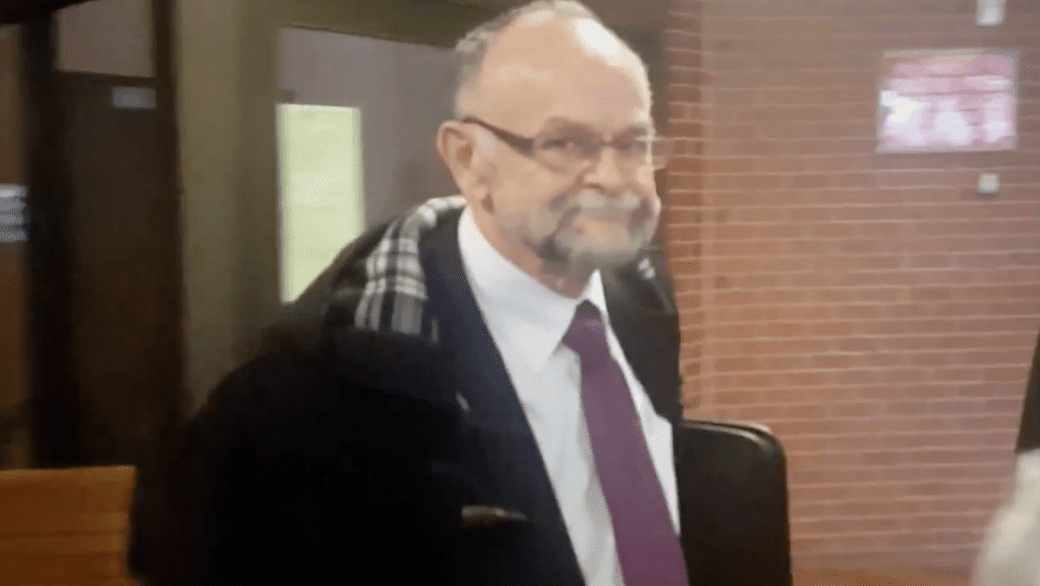“This is a weird case, and the evidence is weird,” defence lawyer Clayton Ruby said today in his closing arguments in the Brent Hawkes sexual assault trial.
Hawkes, a longtime leader of Toronto’s gay community and recipient of the Order of Canada, is facing one charge of indecent assault and one charge of gross indecency for allegedly having oral sex with a 16-year-old more than 40 years ago in Kings County, NS, when he was a high school teacher.
“I have not got the evidence to show that the three witnesses are lying,” Ruby told provincial court Judge Alan Tufts. “But we do have an abundance of evidence that their testimony is unreliable.”
The Crown’s case against Hawkes is based almost entirely on eyewitness testimonies from three witnesses whose identities are protected under a publication ban.
Last week, the alleged victim testified that he and two friends were playing a drinking game at Hawkes’ trailer in the mid-’70s, when Hawkes suggested that they play a strip drinking game instead. He testified that he was heavily intoxicated and naked when Hawkes took him to the trailer’s bedroom where they had oral sex.
Outside of the courtroom, Crown attorney Robert Morrison acknowledged that parts of the witnesses’ testimony could be called weird but maintained that it shouldn’t affect the case. “Just because it’s weird, it doesn’t make it less plausible that it happened. A lot of weird things happen and we see that all the time in provincial court,” he told reporters.
Morrison said witness accounts will always be different and that it’s important to look not only at the contradictions but also at where the stories coincide. “You have to look at the whole picture, rather than just the individual pieces,” he said.
Morrison suggested that Hawkes had contradicted himself in his testimony about not allowing students to drink alcohol at his residence. Hawkes testified that he often had beer and red wine in his home, but that it was only for adults and that he never served alcohol to underage people. Ruby later said that the defence was not disputing that the teens drank alcohol at Hawkes’ home that night.
The Crown argued that evening was fuelled by alcohol but that Hawkes was responsible for initiating the alleged sexual acts.
In his closing, Ruby argued that the Crown had failed to meet its burden of proof beyond a reasonable doubt, framing some of the witness accounts as surreal, bizarre, dreamlike and contradictory. He said that some of the witnesses had filled in the blanks in their memories with assumptions.
“It’s a 40-year-old case with witnesses who were extremely drunk at the time,” Ruby said, suggesting that the alleged victim was so intoxicated that he never had clear memories of the incident at all.
Ruby pointed out multiple contradictions between the witnesses. One witness said that oral sex took place in the living room, while the complainant said it happened in a bedroom. One witness said some people were naked or in underwear, while another maintained that people were fully clothed.
Morrison argued that the witness who said he saw the oral sex in the living room did see it but was mistaken about the location and some of the details.
Ruby later argued that the second witness was suggestible and that the police may have influenced him by giving him details that he later incorporated into his statement.
He argued that 1970s-era teenage homophobia could have influenced the witnesses to create false memories. Ruby also cited evidence from an expert witness who testified earlier that imagined memories are just as powerful as real ones.
“I don’t think he’s faking it. I think he’s tortured,” Ruby said of the alleged victim’s sincerity, while maintaining that the memories were false.
Morrison maintained that the alleged victim did not reconstruct his memory of the alleged assault and that he had testified that he had always remembered it.
None of the allegations against Hawkes has been proven in court.
When the charges against Hawkes were filed in December 2015, his supporters argued that gross indecency is an inherently homophobic charge that should no longer be used by prosecutors.
Judge Tufts is expected to deliver his ruling on Wednesday, Jan 18, 2017.

 Why you can trust Xtra
Why you can trust Xtra


